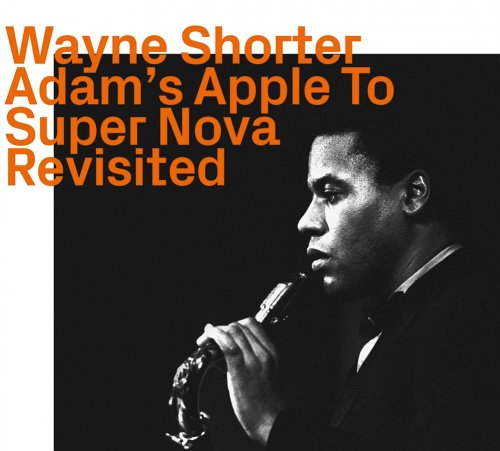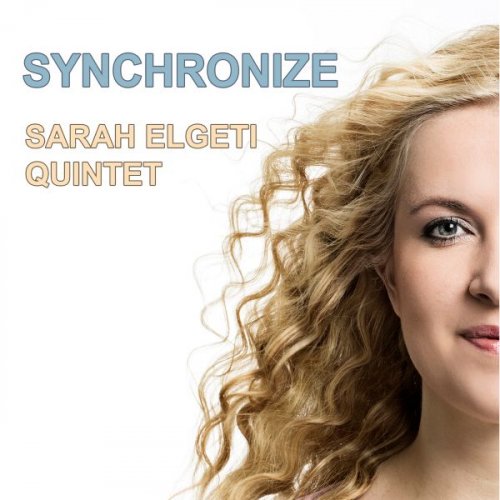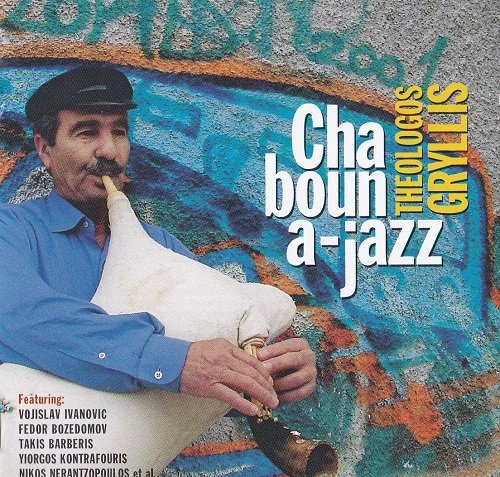Hervé Niquet - Charpentier: Te Deum (1997)
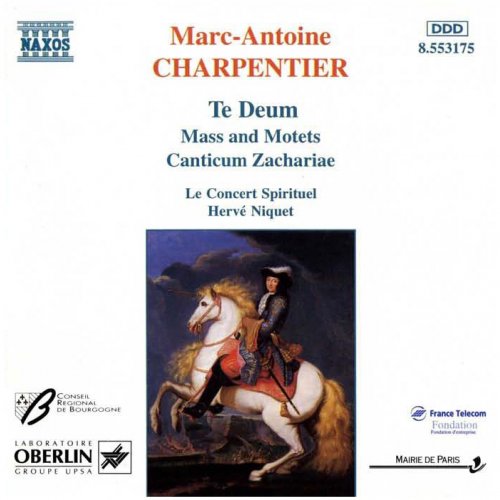
Artist: Hervé Niquet
Title: Charpentier: Te Deum
Year Of Release: 1997
Label: Naxos Classics
Genre: Classical sacred
Quality: FLAC (tracks+.cue,log,scans)
Total Time: 57:05
Total Size: 281 MB
WebSite: Album Preview
Tracklist:Title: Charpentier: Te Deum
Year Of Release: 1997
Label: Naxos Classics
Genre: Classical sacred
Quality: FLAC (tracks+.cue,log,scans)
Total Time: 57:05
Total Size: 281 MB
WebSite: Album Preview
1 Te Deum, H. 147 9:07
Mass, H. 1
2 Kyrie Eleison 3:52
3 Gloria 2:22
4 Credo 7:04
5 Offertory: Precatio Pro Filio Regis, H. 166 7:07
6 Sanctus 1:55
7 Elevation: Panis Quem Ego Dabo, H. 275 5:21
8 Agnus Dei 2:02
9 Domine Salvum Fac Regem 2:02
Canticum Zachariae, H. 345
10 Benedictus 16:15
Marc-Antoine Charpentier (1643 - 1704)
Te Deum, H. 147
Messe et Motets pour l'offertoire et l'élévation
Canticle of Zacharias: Benedictus, H. 345
Marc-Antoine Charpentier never held any official position at the court of Louis XIV. Nevertheless he attempted in April 1683 the open contest for the recruitment of assistants at the Chapel Royal. After success, with fifteen other candidates, in the first test, which consisted of each candidate singing a motet, he fell ill and could not continue. This was obviously a great disappointment for him, but it did not prevent him from becoming the most important composer of sacred music of the reign.
In spite of a career outside the coveted royal institutions, Charpentier was appreciated by the King. One sign of this esteem is the invitation extended to him, at the end of the 1670s, to write music for the services of the Dauphin, only surviving child of the marriage of Louis XIV and Queen Marie-Thérèse; the Dauphin, however, did not succeed to the throne, dying of smallpox in 1712. The Mercure Galant of April 1681 bears witness to the liking of the King for the music of Charpentier: \ Arriving at S. Cloud, he (the King) sent away all his musicians and wished to hear the musicians of Monseigneur the Dauphin until his return to Saint-Germain. Every day there were sung at Mass motets of Monsieur Charpentier & His Majesty did not want to hear others, although it was proposed to him". The music for the Dauphin was written generally for two trebles, a bass and two treble instruments, usually flutes, played by the brothers Anthoine and Joseph Pièche, whose names are written in the manuscript of the music for the Elevation, Panis quem ego dabo, which makes use of an exceptional ensemble of five vocal parts. Some motets are clearly dedicated to the Dauphin, such as the prayer for the King's son, Precatio pro filio Regis, a setting of the text from Psalm LXXI, Deus judicium tuum regi da that King David wrote after having established his son Solomon on the throne of Israel and in which he predicted the future kingdom of Jesus Christ. The comparison with the son of the King of France is an obvious one.
Charpentier lived for nearly twenty years at the Hôtel de Guise, rue de Chaume (the present rue des Archives). He wrote a number of pieces of music, sacred and secular, for the singers employed by Marie of Lorraine, grand-daughter of Henri of Guise. This powerful princess had a great passion for music and from the 1670s engaged in her entourage some fifteen musicians, instrumentalists and singers, Charpentier himself taking part as an haute-contre. The music of Charpentier designed for this ensemble, sacred and secular, was commanded not only by Marie of Lorraine (called Mademoiselle de Guise) but also by Elisabeth of Orléans (called Madame de Guise), youngest daughter of Gaston of Orléans, the brother of Louis XII, and married to the nephew of Mademoiselle de Guise. The Canticum ZachaTiae, dating from 1687, is one of the last and finest works written for the musical establishment of the princesses. The text of the canticle, Benedictus Dominus, attributed to the father of St John the Baptist, is taken from the Gospel of St Luke (I, 68-79). The six-part writing bears witness to Charpentier's contrapuntal ability.
During the whole of the seventeenth century and for a large part of the eighteenth, the sung Mass in France followed the stylistic currents affecting other forms of sacred and secular music. Most of the settings of the Mass to be heard in Paris and in the provinces in the reign of Louis XIV were either Masses already composed some decades ear1ier and sometimes adapted to the taste of the day with instrumental accompaniments, or Masses newly composed but in the old style, a cappella, or in plainchant. Thus the eleven Masses left by Charpentier, in concerted style, stand out particularly and are quite exceptional.
The Mass, H. 1, is probably the first of the eleven vocal Mass settings written by Charpentier. It is in four parts with the accompaniment of two treble instruments and basso continuo. The Sanctus uses two extra voices and the Hosanna is for double choir. Charpentier is one of the rare French composers to have written concerted Masses. The Mass, H. 1, in spite of its modest proportions, offers passages of strong feeling, as in the Credo where the death of Christ (the word passus, suffered)is underlined by chromatic writing for all voices. The motet for the Elevation, Panis quem ego dabo, has been chosen from among a number of pieces composed by Charpentier, intended for the elevation of the sacred Host. Since the reign of Louis XIII, it had been traditional to end the service with the last verse of Psalm XIX, Domine salvum fac Regem. Included here is one of the numerous versions of this text that Charpentier set, ending Mass, H. 1.
The setting of the Te Deum, H. 147, is the last written by Charpentier and seems to date from the period when he was choir-master at the Sainte-Chapelle, between 1698 and 1704, the year of his death. Even if this Te Deum may lack the brilliance of instrumental display, it was surely composed, as was the custom, for an event of importance, usually affecting the King (his recovery from illness, his military victories) or his family (birth, baptism or marriage).
Catherine Cessac
(English version by Keith Anderson)
Le Concert Spirituel
Hervé Niquet, conductor
Le Concert Spirituel was established in 1725 by Anne Danican Philidor and was the first concert organization in France, specialising in the performance of French Grands Motets by composers such as Gilles, Campra, Mondonville and Rameau. The concerts were given in the Salle des Cent Suissesin the Palace of the Tuileries in Paris, but came to an end with the French Revolution in 1791. In 1988 Hervé Niquet, one of the leading specialists in France in baroque music, decided to revive the Concert Spirituel in order to explore again the repertoire of music originally composed for this purpose in the eighteenth century. Since then the Concert Spirituel has given performances in the principal cities and festivals of Europe and has issued a number of recordings that have received critical acclaim in the international press.
Laboratoire Pharmafarm
The Laboratoire Pharmafarm is happy to lend its support to the Concert Spirituel. There have always been close connections between musicians and those concerned with health in their shared contribution to the well-being of soul and body. Pharmafarm is delighted to sponsor this valuable moral and cultural enterprise.
Mairie de Paris
From its establishment by Philidor in 1725 until its disappearance in the turmoil of the Revolution, the Concert Spirituel was one of the most brilliant elements in the musical life of Paris and hence of France and of Europe.
I am particularly happy that the City of Paris should be associated with the revivaland progress of this magnificent Baroque ensemble. Under the direction of Hervé Niquet, the Concert Spirituel has today brought alive this repertoire, known or awaiting rediscovery, that it first created, bringing distinction to the heart of a capital and of a century the brilliance of which still flourishes.
To all those who will have the good fortune to hear the Concert Spirituel, I wish a share in the enthusiasm, curiosity and, it goes without saying, the talent with which the ensemble distinguishes all the music that it brings to our ears.
Hélène Macé de Le
Te Deum, H. 147
Messe et Motets pour l'offertoire et l'élévation
Canticle of Zacharias: Benedictus, H. 345
Marc-Antoine Charpentier never held any official position at the court of Louis XIV. Nevertheless he attempted in April 1683 the open contest for the recruitment of assistants at the Chapel Royal. After success, with fifteen other candidates, in the first test, which consisted of each candidate singing a motet, he fell ill and could not continue. This was obviously a great disappointment for him, but it did not prevent him from becoming the most important composer of sacred music of the reign.
In spite of a career outside the coveted royal institutions, Charpentier was appreciated by the King. One sign of this esteem is the invitation extended to him, at the end of the 1670s, to write music for the services of the Dauphin, only surviving child of the marriage of Louis XIV and Queen Marie-Thérèse; the Dauphin, however, did not succeed to the throne, dying of smallpox in 1712. The Mercure Galant of April 1681 bears witness to the liking of the King for the music of Charpentier: \ Arriving at S. Cloud, he (the King) sent away all his musicians and wished to hear the musicians of Monseigneur the Dauphin until his return to Saint-Germain. Every day there were sung at Mass motets of Monsieur Charpentier & His Majesty did not want to hear others, although it was proposed to him". The music for the Dauphin was written generally for two trebles, a bass and two treble instruments, usually flutes, played by the brothers Anthoine and Joseph Pièche, whose names are written in the manuscript of the music for the Elevation, Panis quem ego dabo, which makes use of an exceptional ensemble of five vocal parts. Some motets are clearly dedicated to the Dauphin, such as the prayer for the King's son, Precatio pro filio Regis, a setting of the text from Psalm LXXI, Deus judicium tuum regi da that King David wrote after having established his son Solomon on the throne of Israel and in which he predicted the future kingdom of Jesus Christ. The comparison with the son of the King of France is an obvious one.
Charpentier lived for nearly twenty years at the Hôtel de Guise, rue de Chaume (the present rue des Archives). He wrote a number of pieces of music, sacred and secular, for the singers employed by Marie of Lorraine, grand-daughter of Henri of Guise. This powerful princess had a great passion for music and from the 1670s engaged in her entourage some fifteen musicians, instrumentalists and singers, Charpentier himself taking part as an haute-contre. The music of Charpentier designed for this ensemble, sacred and secular, was commanded not only by Marie of Lorraine (called Mademoiselle de Guise) but also by Elisabeth of Orléans (called Madame de Guise), youngest daughter of Gaston of Orléans, the brother of Louis XII, and married to the nephew of Mademoiselle de Guise. The Canticum ZachaTiae, dating from 1687, is one of the last and finest works written for the musical establishment of the princesses. The text of the canticle, Benedictus Dominus, attributed to the father of St John the Baptist, is taken from the Gospel of St Luke (I, 68-79). The six-part writing bears witness to Charpentier's contrapuntal ability.
During the whole of the seventeenth century and for a large part of the eighteenth, the sung Mass in France followed the stylistic currents affecting other forms of sacred and secular music. Most of the settings of the Mass to be heard in Paris and in the provinces in the reign of Louis XIV were either Masses already composed some decades ear1ier and sometimes adapted to the taste of the day with instrumental accompaniments, or Masses newly composed but in the old style, a cappella, or in plainchant. Thus the eleven Masses left by Charpentier, in concerted style, stand out particularly and are quite exceptional.
The Mass, H. 1, is probably the first of the eleven vocal Mass settings written by Charpentier. It is in four parts with the accompaniment of two treble instruments and basso continuo. The Sanctus uses two extra voices and the Hosanna is for double choir. Charpentier is one of the rare French composers to have written concerted Masses. The Mass, H. 1, in spite of its modest proportions, offers passages of strong feeling, as in the Credo where the death of Christ (the word passus, suffered)is underlined by chromatic writing for all voices. The motet for the Elevation, Panis quem ego dabo, has been chosen from among a number of pieces composed by Charpentier, intended for the elevation of the sacred Host. Since the reign of Louis XIII, it had been traditional to end the service with the last verse of Psalm XIX, Domine salvum fac Regem. Included here is one of the numerous versions of this text that Charpentier set, ending Mass, H. 1.
The setting of the Te Deum, H. 147, is the last written by Charpentier and seems to date from the period when he was choir-master at the Sainte-Chapelle, between 1698 and 1704, the year of his death. Even if this Te Deum may lack the brilliance of instrumental display, it was surely composed, as was the custom, for an event of importance, usually affecting the King (his recovery from illness, his military victories) or his family (birth, baptism or marriage).
Catherine Cessac
(English version by Keith Anderson)
Le Concert Spirituel
Hervé Niquet, conductor
Le Concert Spirituel was established in 1725 by Anne Danican Philidor and was the first concert organization in France, specialising in the performance of French Grands Motets by composers such as Gilles, Campra, Mondonville and Rameau. The concerts were given in the Salle des Cent Suissesin the Palace of the Tuileries in Paris, but came to an end with the French Revolution in 1791. In 1988 Hervé Niquet, one of the leading specialists in France in baroque music, decided to revive the Concert Spirituel in order to explore again the repertoire of music originally composed for this purpose in the eighteenth century. Since then the Concert Spirituel has given performances in the principal cities and festivals of Europe and has issued a number of recordings that have received critical acclaim in the international press.
Laboratoire Pharmafarm
The Laboratoire Pharmafarm is happy to lend its support to the Concert Spirituel. There have always been close connections between musicians and those concerned with health in their shared contribution to the well-being of soul and body. Pharmafarm is delighted to sponsor this valuable moral and cultural enterprise.
Mairie de Paris
From its establishment by Philidor in 1725 until its disappearance in the turmoil of the Revolution, the Concert Spirituel was one of the most brilliant elements in the musical life of Paris and hence of France and of Europe.
I am particularly happy that the City of Paris should be associated with the revivaland progress of this magnificent Baroque ensemble. Under the direction of Hervé Niquet, the Concert Spirituel has today brought alive this repertoire, known or awaiting rediscovery, that it first created, bringing distinction to the heart of a capital and of a century the brilliance of which still flourishes.
To all those who will have the good fortune to hear the Concert Spirituel, I wish a share in the enthusiasm, curiosity and, it goes without saying, the talent with which the ensemble distinguishes all the music that it brings to our ears.
Hélène Macé de Le
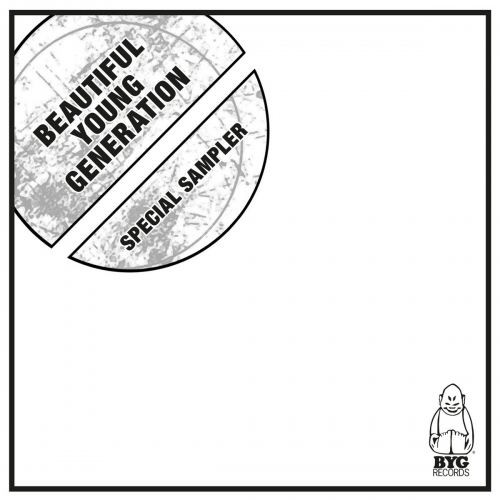

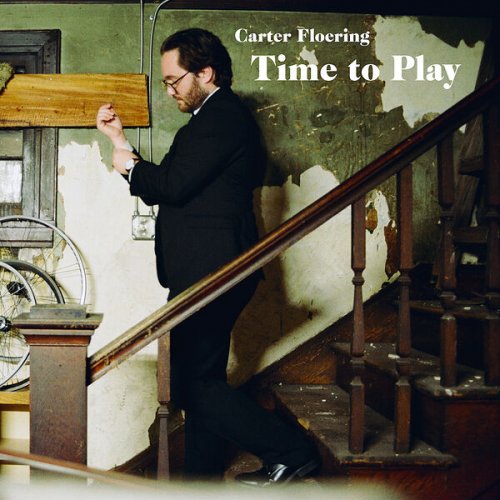
![Corey Fonville, Sam Fribush, Charlie Hunter - R&B Organ Trio (EP) (2026) [Hi-Res] Corey Fonville, Sam Fribush, Charlie Hunter - R&B Organ Trio (EP) (2026) [Hi-Res]](https://www.dibpic.com/uploads/posts/2026-01/1768309902_folder.jpg)
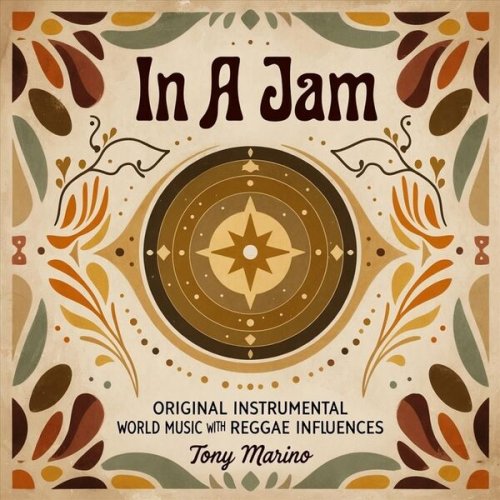
![Robert Stillman - 10,000 Rivers (2026) [Hi-Res] Robert Stillman - 10,000 Rivers (2026) [Hi-Res]](https://img.israbox.com/img/2026-01/10/8jwz0bin2i14qjmws9vecjwx5.jpg)
